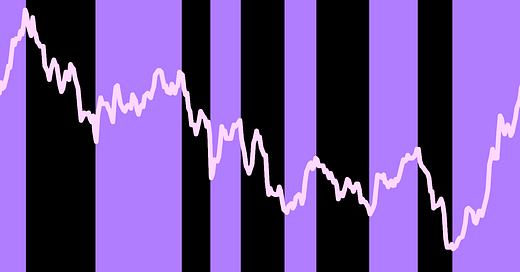How Economic Data and Fed Policy Moves Are Shaping the Stock Market

February 28, 2025
The stock market has experienced heightened volatility following the release of key economic data and Federal Reserve policy announcements. As investors digest news on inflation, employment figures, and the Fed’s decision on interest rates, the market has been swinging in both directions, reflecting the uncertainty and mixed signals surrounding the future of the economy. The current market landscape is dominated by rising concerns over inflationary pressures, a potential slowdown in economic growth, and the Fed’s actions to combat these issues.
Economic Data: Inflation and Employment FiguresThe latest economic data has been a major factor in the market’s fluctuations. The two most watched indicators—inflation and employment—are central to understanding market sentiment and Fed policy.
Inflation DataInflation has been a significant concern for investors and the Federal Reserve over the past year. The Consumer Price Index (CPI), which measures the overall price change of goods and services, showed an unexpected uptick in inflation for the past month. Core inflation, which excludes volatile food and energy prices, also saw a rise, indicating that price pressures are still persistent in various parts of the economy.
On the employment front, the most recent jobs report revealed that the U.S. economy added more jobs than anticipated, signaling that the labor market remains resilient despite inflationary pressures. Unemployment continues to hover at historically low levels, suggesting that the economy is still expanding.
The Federal Reserve’s role in the current economic environment cannot be overstated. Its decisions regarding interest rates have a profound effect on the stock market, influencing everything from corporate borrowing to consumer spending. The Fed’s recent announcements and the ongoing expectation of additional rate hikes have had investors adjusting their portfolios in real time.
Rate Hikes and Market ReactionsThe Fed's ongoing interest rate hikes are aimed at curbing inflation by making borrowing more expensive. These hikes, while necessary to cool the economy, have raised concerns about their potential to slow down growth and even tip the U.S. economy into a recession. The stock market has historically been sensitive to rate hikes, as higher rates can reduce corporate profits by increasing borrowing costs and lowering consumer spending.
In addition to its rate hikes, the Fed’s forward guidance—its projections about future monetary policy—is also closely monitored by investors. If the Fed signals that it plans to continue tightening, this can lead to further sell-offs in stocks, especially in sectors that rely on cheap financing. Conversely, if the Fed takes a more dovish tone, suggesting that it may pause or reverse rate hikes, this could provide a temporary boost to market sentiment.
Market Volatility and Investor StrategiesGiven the current economic uncertainty and the Fed’s aggressive stance on interest rates, market volatility has increased. The stock market has experienced significant swings in response to the latest economic reports, with sectors like tech and real estate being hit hardest by rate hike fears, while financials and energy stocks have been relatively resilient.
Tactical Adjustments for InvestorsFor investors, the key to navigating these volatile times is diversification. Here are a few strategies that can help:
Looking ahead, the direction of the stock market will depend heavily on the economic data and how the Federal Reserve reacts to it. If inflation continues to remain elevated, the Fed may need to continue its aggressive stance on rate hikes, which could cause further short-term pain for equities. However, if inflation moderates and the economy shows signs of slowing down, the Fed may pause or reverse course, which could provide a tailwind for stocks.
The key takeaway for investors is to stay informed, remain flexible, and adjust portfolios as new data and policy announcements unfold. With inflation still a significant concern, and the Fed firmly committed to raising rates, investors should be prepared for continued market volatility as they adjust their strategies to the new economic reality.

Investing in Future Trends for Long-Term Growth
Thematic investing focuses on future trends shaping industries. Learn how to capitalize on tomorrow’s opportunities today

Markets React Positively as Election-Driven Optimism Grows
Stock markets are experiencing a strong post-election rally, driven by investor optimism, policy expectations, and economic growth prospects. Will the momentum continue

Annuities Provide Financial Stability and Retirement Security
Annuities offer retirees a reliable stream of lifetime income, protecting them from market volatility and ensuring long-term financial security

The bank repositions its operations, scaling back in Europe, UK, and the Americas.
HSBC is undertaking its largest investment banking retrenchment in decades, planning to exit its M&A and ECM operations in key Western markets. This restructuring focuses on shifting resources to Asia and the Middle East while consolidating debt capital markets and finance-led activities

Stock Market Trends, Economic Updates, and Investment Insights
This week, U.S. markets faced volatility amid earnings reports, Federal Reserve signals, and economic data releases. Investors analyze inflation trends and interest rate forecasts while navigating sector-specific shifts in technology, energy, and financial markets.

Value stocks remain underappreciated as investors focus on growth
Despite historical outperformance over the long term, value stocks remain underweight in many portfolios. With markets favoring growth and technology stocks, are investors overlooking key opportunities in undervalued assets

Stocks remain resilient despite rising interest rates—here’s why.
Higher interest rates often trigger fears of a market downturn, but historical data suggests otherwise. While some sectors face challenges, others thrive in a high-rate environment. Investors should focus on strategic allocation rather than panic selling

Market predictions and trends shaping the equity landscape in Q1 2025
The Q1 2025 equity market outlook explores key factors shaping investor sentiment and market direction, including global economic trends, corporate earnings, and sector rotations. Understanding these factors will be crucial for positioning portfolios in the coming months

Cyclical stocks and economic growth trends lead the market rally.
Economic resilience continues to support a robust cyclical rally, as key sectors benefit from sustained recovery. This outlook emphasizes growth in consumer demand, infrastructure, and industrials, driving cyclical stock performance
The Atlantic Daily
Get our guide to the day’s biggest news and ideas, delivered to your inbox every weekday and Sunday mornings. See more newsletters
.webp)
Ideas That Matter
Subscribe and support more than 160 years of independent journalism.
Subscribe